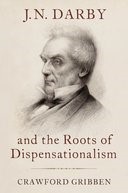
Crawford Gribben
Reviewed by: Clifford L. Blair
J. N. Darby and the Roots of Dispensationalism, by Crawford Gribben. Oxford University Press, 2024. Hardback, 256 pages, $39.95. Reviewed by OP pastor Clifford L. Blair.
This is a short book but not slight. Dr. Gribben, professor of history at Queen’s University, Belfast, brings substantial scholarship to his subject. (A simple metric: About a third of this volume is notes and bibliography.) His theological portrait of Darby cuts against popular misconceptions. Between a substantive introduction and conclusion, he considers four areas of Darby’s theology: soteriology, ecclesiology, pneumatology, and eschatology. The book is too dense to consider closely in a short review so I will constrain myself to three impressions.
I knew Darby was an educated man but had little grasp of the breadth of his gifts. Educated in classics (taking a gold medal from Trinity College, Dublin, in 1819), he practiced law briefly before turning toward a clerical vocation. He was ordained as a priest in the Church of Ireland in 1826. In a few years, he was effectively separated from the Irish Church but flourishing as a leading light of the Plymouth Brethren where he would continue until his death in 1882. Gribben writes, “His achievements were extraordinary. During his lifetime, he wrote more than 850 separately published items . . . with subjects ranging from biblical exposition, theology, and devotional poetry to Greek grammar, political commentary, and reflections on the work of J. S. Mill . . . he led projects to translate the New Testament into German (1855), French (1859), and English (1867)” (2). His notebooks touched on even broader interests from Hinduism to Kant. He is reported to have preached in English, Irish, French, German, Italian, Dutch, and perhaps even Maori when visiting New Zealand (16).
Dispensationalism is associated in my mind with Arminianism (John MacArthur notwithstanding). I was surprised to discover the tenor of Darby’s soteriology: “Late in life, he referred to the doctrine of unconditional election to explain why he had been saved while others had not: ‘When I was converted, the quarrel about Calvinism was pretty strong, but I said to myself, How came I to be brought out, and all my companions left where they were?’ Darby was a Calvinist because the Genevan doctrine of salvation made sense of his own experience” (34). Gribben opines that using the Canons of Dort as a measure, “Darby was an idiosyncratic but orthodox Calvinist” (55).
More surprising, eschatology was not a dominant interest: “Despite his reputation as the most influential eschatological thinker, his writings on the subject occupy only four of the thirty-four volumes of his Collected Writings” (114). More striking still, while Darby is commonly considered the father of dispensationalism, he would most likely not own, or even recognize, the theological system of that name as it appears today. Modern dispensationalism from the Scofield Reference Bible (1909) forward, though certainly not uniform, is fairly stable in saying that history from creation is divided into consecutive dispensations (usually seven), and that we live in the penultimate dispensation (the church age, or ecclesial dispensation). The millennium is the final dispensation inaugurated with Christ’s return. It is surprising to learn that such terminology and thinking would have been foreign to Darby. His definition of dispensation changed over time, but he found them only between the flood and the cross and did not consider either the church age or the millennium as dispensations (134).
In a theologically dense work there will be many places for Christians to disagree, but two stood out. Darby staunchly rejected the imputation of Christ’s righteousness as part of justification; this is accomplished by Christ’s sin-bearing alone. In his mind, the doctrine of active obedience introduced a form of works righteousness. Gribben quotes Darby: “We are not justified by the works of law, by whomsoever done, but entirely in another way. It was never God’s intention to bring in righteousness by law” (50). I find his grasp of what Christ has done for us impoverished. Equally troubling, but oddly less explored in this otherwise thorough book, is his foundational notion of the separation of Israel and the church. We are told that this idea came early in his theological formation, in the late 1820s (10, 62), and it is often referenced, but its formation is not canvassed. This defining feature of Darby’s theology continues in most forms of modern dispensationalism. In my judgment it is a catastrophic misunderstanding of the Scriptures. I agree with Al Mohler’s observation made in an excellent interview with Gribben (available online), that this doctrine opens “a colossal chasm on a giant question related to the gospel itself . . . between classical dispensationalism and classical Protestant theology.”
This book is accessible to the motivated laymen or the person already somewhat familiar with the theology and history of this period.
January 18, 2026
January 11, 2026
Texts that Transform: Church and Ministry
January 04, 2026
December 28, 2025
December 21, 2025
December 14, 2025
December 07, 2025
© 2026 The Orthodox Presbyterian Church